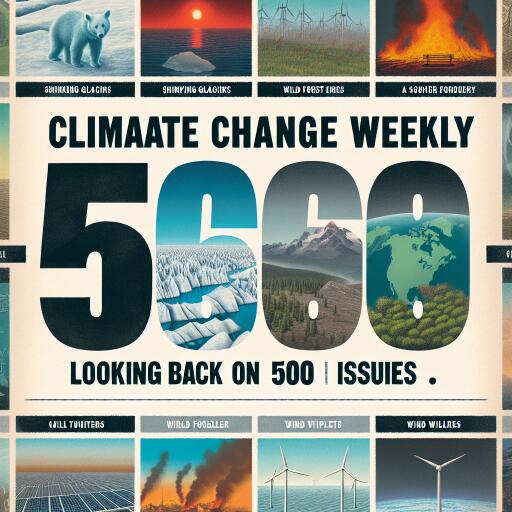
Climate Change Weekly #500: Looking Back on 500 Issues, Celebrating a Milestone
This week marks a significant milestone for Climate Change Weekly (CCW), as we publish our 500th edition. What began as a modest initiative to cover the unfolding story of climate science, economics, and policy has blossomed into a comprehensive, widely read newsletter. With over 6,000 weekly subscribers and an even broader online readership, CCW stands as a testament to the enduring interest and critical importance of climate change discussions.
From its inception, CCW was poised to challenge the prevailing narratives around climate change, emphasizing factual integrity and the pursuit of truth. The landscape of climate change discourse is fraught with complexity and contention, often overshadowed by the vested interests of powerful factions. Despite the daunting nature of this endeavor, the commitment to exposing the “apocalyptic climate change fairy tale” has remained unwavering.
The comparison of climate change to seemingly intractable issues like the Social Security system reflects a sobering reality: as long as there are substantial stakes in terms of money and power, the climate change debate will persist, irrespective of the factual landscape. This underscores the necessity of persistence in the face of adversity, showcasing the need to continuously illuminate truths in a sea of misinformation.
Central to the mission of CCW is the advocacy for the indispensable role of fossil fuels in ensuring human well-being. Contrary to the dominant narrative of climate catastrophe, the narrative within CCW emphasizes the detrimental impacts of banning fossil fuels on societal well-being and individual freedom. Highlighting the ineffectiveness of such measures in altering climate patterns, CCW positions itself as a champion for both environmental sensibility and human prosperity.
Over the years, the evolution of CCW has mirrored the dynamic nature of the climate change debate. Initially featuring a lead essay and a selection of concise summaries, the newsletter has adapted to provide more in-depth analyses, reflecting the increasing complexity of issues at hand. From discussions on environmental, social, and governance (ESG) standards to the push for electric vehicles and the concerning trend of lawfare, CCW has expanded its coverage to address the multifaceted challenges of contemporary climate policy.
The transition from the Kyoto Climate Treaty to the critique of the Paris Climate Agreement exemplifies CCW’s adaptability and continued relevance in critiquing global climate initiatives. Moreover, despite the passage of years and the presentation of new evidence, several debunked climate change myths continue to resurface, necessitating a steadfast commitment to fact-based discourse.
In reflecting on the journey of CCW, it is clear that the work of challenging misconceptions and advocating for effective public policy is far from complete. The persistence of climate change as a central societal issue underscores the ongoing necessity for informed, thoughtful, and rigorous analysis.
As CCW embarks on the next chapters of its journey, it carries with it a legacy of dedication to the truth and a commitment to enhancing societal well-being through sound policy advocacy. Here’s to the next 500 issues and the enduring pursuit of clarity in the climate change conversation.





Leave a Reply